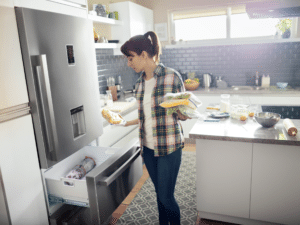
“The majority of the environmental impact of an appliance occurs during its in-home use,” says Nathan Mouw, Senior Director-Global Product Safety and Regulatory Affairs, Whirlpool Corporation.
Fatih Demiray, Manager-Governmental & Regulatory Affairs, Product Compliance, Arçelik A.Ş., agrees, “Over 95 per cent of the carbon dioxide emissions of the lifecycle of an appliance come from energy use during this phase.”
Energy-efficient appliances can make a big difference in reducing this impact. This translates to cost savings for consumers.
“Consumers want to reduce their monthly energy bill,” notes Christoph Thim, Head of Liaison Associations, Standardization, BSH Hausgeräte GmbH.
Increased Use of Refrigerators
In developing countries and emerging economies the number of refrigerators in use is expected to double to just under one billion in the next 15 years. In these countries, refrigerators accounted for about 10 per cent of household electricity consumption in 2015.
This is an opportunity for manufacturers to work with governments to accelerate the uptake of energy-efficient refrigerators.
“Future growth will take place in emerging markets; the challenge will be sustainable development. Energy-efficient appliances contribute to a sustainable development,” Thim says.
Producing energy-efficient appliances is also good business. “Companies that incorporate climate change into their business strategy will be in a winning position tomorrow,” argues Demiray.
Manufacturers are working toward cutting down the climate-change impacts of their products. “Electrolux was one of the first companies to introduce refrigerators and freezers with climate friendly natural refrigerants and insulation gases in the European Union,” says Victor Sundberg, VP Environmental and EU Affairs, Electrolux.
Partnership Benefits Manufacturers
Partnering with United for Efficiency helps manufacturers to tackle the sustainable-development challenge. “We have learned a lot about partners,” says David Manrique, Sustainable Development Leader, Mabe.
Through United for Efficiency partners acquire information they integrate in their business strategies. “We learn how countries will move ahead with policy. This becomes part of our plans for future products,” says Sundberg.
Working together also allows partners to go further, faster. “Initiatives like this can make tremendous progress in furthering goals in a fraction of the time that stakeholders could do on their own,” says Mouw.
Manrique agrees: “We impact more people than we could have ever imagined throughout our region thanks to United for Efficiency.”
New Partners Welcome
Join us! United for Efficiency is open to countries and stakeholders interested in moving markets to energy-efficient products. United for Efficiency partners contribute to reducing the world’s growing electricity consumption, mitigate climate change and receive international visibility.